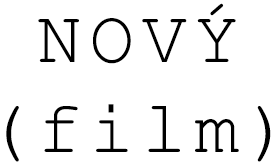 Avner Faingulernt, an Israeli psychologist, director and film educator, is primarily bound to the Czech environment by film workshops, which he has been organizing for years for Israeli and Czech students of film in the Negev Desert. This year he presented his latest film or rather film diptych In the Desert: Omar’s Dream and Avidan’s Dream (2018) at AFO festival.
Avner Faingulernt, an Israeli psychologist, director and film educator, is primarily bound to the Czech environment by film workshops, which he has been organizing for years for Israeli and Czech students of film in the Negev Desert. This year he presented his latest film or rather film diptych In the Desert: Omar’s Dream and Avidan’s Dream (2018) at AFO festival.
Both „dreams“ are in full-length footage and are screened exclusively together. Thematically, as in several previous Avner films, it is a phenomenological meditation on the forms and possibilities of life in the Gaza Strip. Given Avner’s emphasis on the immediacy of observation and immediacy of sharing, I interleave a short medallion of his creative and pedagogical method with excerpts from the recordings of his thematic narratives.
Born in the Bror-Hayil kibbutz in the south of Israel, Avner co-founded the film department at Sapir University in Sderot, 20 years ago, in the immediate vicinity of the Gaza Strip. Given this proximity, hardly any filmmaker is able NOT to film about Israeli-Palestinian conflict. However, this filming often tends to be just a mere illustration of its authors‘ clear-cut theses, which Avner did not like. He began to ask himself, who are the „others“ of whom everybody seem to have such a clear and complete view of? Who are the compatriots of his own nation, with whom he is politically inconvenient, that is, the post-sionist Jewish settlers of the West Bank? And who are the Palestinians that try to keep living in the same place, despite of all Isreali atttempts of getting rid of them?
From the in-depth questioning and seemingly aimless passing of the desert back and forth, from the cautious examination of the various potential protagonists at first from a distance and later from a cautious approach, two main characters gradually emerged. Palestinian farmer Omar with his family – and a Jewish farmer Avidan first with a friend, and then with his family, too. However, Avner did not come to discuss with his heroes. Neither the audience nor the protagonists for example learn about his de facto ultra-left worldview and sharp controversy with Netanyahu’s politics.
Avner rode to his characters to observe – everything. He was trying to get them used to his silent presence at first. Mostly he came alone with the camera. For five years he watched Omar and Avidan grow sheep, break up relationships and create new ones, grow their families and face their farmer’s fate and the struggle with quite harsh reality of farmers ‚lives.
The chosen dramaturgical style of the editing went very precisely towards the way the film was created. Two separate units supervised by a director who knows too well that every cut is a manipulation of a kind. Many friends have long persuaded him to assemble both stories in a single movie, but Avner resolutely refused. Just as he refuses occasional requests or terms of festivals to show or give just one of the films.
He understood that the power of what happened in front of him in the desert and what he had managed to capture lies in the opposite: in the existence of several parallel narratives next to one another when none is superior to the other – and none is interpreted by the optics of the other.
The result is overwhelming: after his projections behind him, both his left-wing friends and the Palestinian Bedouins come to tell him that, despite their initial beliefs and often against their will, they felt sympathetic to the other and found understanding for something they never wanted to understand. Listen to the first part of the interview.

Similarly radically different as Avner’s thinking/living-through-the-
Of course that Sapir students have to go through standard theoretical courses as well, but with Avner they are mainly „going out“. They discover their possibilities outdoor a bit like on the childhood camps for scouts. How does a quite spoiled city person deal w/ sleeping outdoor for example? How does such a person deal with sleep deprivation? What questions does he or she asks then? What answers will he or she receive? How can an Israeli student of film handle a stay in Arabic-speaking Bedouin village in the middle of nowhere, that is not even on the map, because it is not recognized by Israeli officials as existent? What kind of film it is possible to make in such a place when you don ‚t even understand the language? What boundaries of personal comfort must fall and how must one „fail“ to learn something about himself – and about others?
But Avner also rejects any pathos associated with the idea of a permanent „open search for truth“. He knows that somethiing like a permanent „open quest“ is almost impossible; that it can only be endlessly attempted. He is again guided by Delleuze. He says that the essential in human knowledge takes place in moments of „fissure of unthinking“, where one concentrates and does not concentrate at the same time.
Given the possible profound understanding to the topic that Avner ‚s last film mediates, it seems, that there is little things that embrace the fissure of unthinking as much as the patient observations with the camera. The same can be said about the way of his teaching, after which hardly anyone remains the same as he/ she was before. Listen to the second part of interview with Avner Faingulernt.






